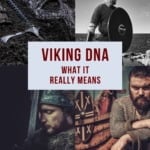Viking DNA and the pitfalls of genetic ancestry tests.
A middle-aged white man raises his sword to the skies and roars to the gods. The results of his genetic ancestry test have just arrived in his suburban mailbox.

His eyes fill with tears as he learns that he is “0.012% Viking”. These are the scenes from a video advertisement for the TV-series Vikings.
Read more: Norwegian Genealogy: How To Find Your Ancestors
Keen to find Viking DNA
This man is certainly not the only one yearning for a genetic test to confirm his Viking ancestry. A plethora of companies around the world market DNA-tests that promise to provide scientific facts about your identity.
These companies often claim to provide a complete view of your ancestry, even though they in reality only compare your DNA with other customers in their database.
According to recent estimates, over 26 million people from across the world have purchased a genetic ancestry test.
In the wake of this hype, researchers have begun to investigate how the tests affect our perceptions of ourselves. How do people make sense of a test result stating that they are, for instance, 35% Ashkenazi Jewish, 27% British or 4% western Asian?
Some researchers have concluded that such tests make customers believe that humanity can be divided into biological races, and that customers see the tests as a way of discovering their “true” identities.

Other researchers have argued that people use their test results selectively, “picking and choosing” the genetic data they find compatible with their personal desires and aspirations. From this perspective, taking a genetic ancestry test involves some level of creative interpretation.
What it means to have ‘Viking DNA'
In our new study, we carried out interviews with people from the US, the UK and Sweden who had purchased genetic ancestry tests to see if they were related to Vikings.
Since the test results did not include the term “Viking”, most of them pointed to the category “Scandinavia” in their ethnic charts as proof of having Viking ancestry.
Almost all of the people in our study saw their results as scientific confirmation of either “being related to Vikings” or of actually “being a Viking”.

As a man from the US put it, the results “began to confirm or at least lay the basis for the person that I am.” In a similar way, a woman from Sweden said that her test allowed her to “know who I am and what my origins are”.
Read more: The History of the Vikings
However, what the tests actually proved was based on creative interpretation. In this sense, several of our interviewees took images of “the Viking” fostered in popular culture and political propaganda, and used them to make sense of their own lives.
For example, people with experiences of violence and abuse used their “Viking genes” as explanation – describing Vikings as warriors and berserkers.
“Knowing that I am descended from Vikings,” a man from the US said, “has made it clearer to me why there might be a genetic preponderance of violence and explosive anger in my family.”

In a similar way, interviewees who considered themselves to be restless described the Vikings as explorers and naval engineers. A woman from the US said, “I have to see new lands,” adding that it was due to “the Viking” in her.
It seems then that the use of genetic ancestry tests can facilitate a kind of “genetic determinism“, in which a person’s life is the natural result of their genome. From this perspective, humans appear to not have much control over their lives.
Genetics and race
The impact of genetic ancestry tests is not just limited to people purchasing the tests. By activating concepts like “Viking”, “British” or “Jewish”, such tests also play into a wider politics of race and ethnicity.
Vikings have been used as a common sign for a demographic which has historically been affiliated to notions of whiteness and Nordic nationalism.

While purporting to have Viking ancestry does not make a person a racist or a proponent of white supremacy, it should be remembered that the figure of the Viking, which served as a prominent symbol in European fascist movements during the 20th century, is far from innocuous.
By dividing people into racial or national categories, genetic ancestry tests might be used to trigger tensions between different groups. Even if a person's “Viking DNA” only amounts to a small amount, it can still provide an allegedly scientific basis for racial division.
In an era marked by increasing xenophobia and ethnic chauvinism, it is important to be aware of the interplay between genetics and ideas of race.
This article was written by Anna Källén, Associate Professor of Archaeology and Researcher in Heritage Studies, Stockholm University, and Daniel Strand, Ph.D. in History of Ideas at Centre for Multidisciplinary Studies on Racism, Uppsala University. It was first published on The Conversation.



This article is so stupid. No normal minded person would think like this except of maybe the guy who wrote this. I know people who use DNA test because they also have a family geneology tree, for example my dads family was from Southern Germany and they all have dark hair und brown eyes. My dad always told me that his ancestors are from Italy and well his mom took a DNA test and she got 20% Italian DNA. A DNA test doesn’t change your ethnicity or nationality. Normal people use DNA test to confirm something from a family tree or ancestry. Most people I know don’t care about DNA test or their ancestors. Normal people don’t think about race or racism all day because they work and have family, health issues or other stuff going on.
As more recent archeological tests indicate, “Viking” is not DNA so much as a job description. The Vikings enrolled many people from their travel into their ranks. I agree with the prior comment, a reasonable interest in DNA is simply to understand your history and where you came from. This was true for me, rather than a sense of exclusivism it helped me understand my diversity, albeit largely Norwegian but different parts of Norway some of which emigrated from Sweden.
I can’t see it as a problem, if it’s just to roughly check a lineage ?
Unfortunately it’s too often used for other, not so benign, motives / objectives ?
If it is true that it isn’t even a proper DNA analysis, then it is wrong, and not worth the complications, +ve, or-ve, that it generates.
If so the author is right to ‘Out’ it!
I, like everybody else, was about 9 months to late to have any say in my lineage….so live with it…you can still go a bit ‘Viking’ if you have a mind to ?
Doesn’t this more confirm the way the writer views the world? My test showed that I’m 65% Scandinavian with strong links to Norway and Iceland and 39% Celtic. Now do I think I’m a beserker…..nope. But I link the heritage and insight it gives me in roots. I love Norway and the pagan traditions not because of the test. The test to me is more of an affirmation of things that were already there….
And the comment about symbolism and fascism are just plain dumb. In that line of thought Hindus should ditch the millennia old symbol the swastika because it was misused. I think not…..
This article is full of assumptions and passive aggressive writing.
Maybe some of us want to know if we have Viking in our blood because of health issues. My father has COPD; his brother doesn’t. I’m 29% Scandinavian and sounds like my father has a higher percent than I do.
I looked into if I had Viking DNA to see if I could help my father. I wanted to find some sort of relief for him if his DNA was understood.
Vikings carried worms from what they ate and it altered their genes where they were predisposed to breathing problems such as COPD and emphysema. There is a A1AT deficiency in the blood and people today with lung diseases and if you have Scandinavian blood and a lung disease, you more than likely have some Viking in you.
Now, that’s not a good thing. It’s a horrible thing and not something you wish you had. I don’t know what people this author is talking to, but it’s not a good thing to have Viking in you. Sounds like a bunch of pretentious people who wish they were that interesting or it’s wishful thinking from the author themselves.
Not everyone goes out of their way to do a DNA test in order to conjure up an identity. That’s stupid. Most of us want to find lost family, or are adopted and want to know where we come from, or like myself, I want to find if there is some relief to a health issue that I suspect a family member has because of a possible deficiency.
Not everything is about creating an identity and the author should know this. Finding out if you have that blood can help other family down the line.
This gives “my fellow Norwegians” energy, pal
iykyk